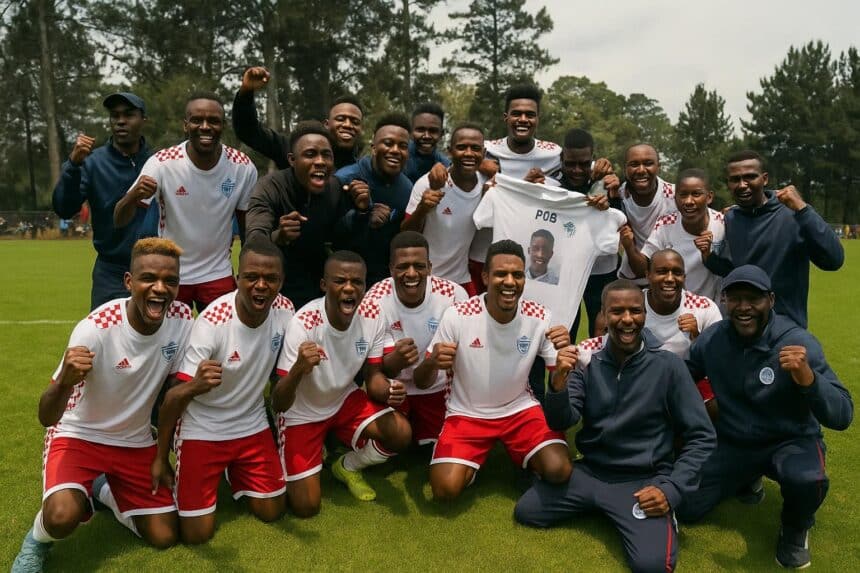A playoff mastered
The Racing Club de Brazzaville finally broke through the play-off wall on 26 August, edging ASP de Pointe-Noire 2-1 at the FIFA technical centre in Ignié and validating the 1-0 first-leg win that had already smelled of promotion.
Four seasons after leaving the elite, the blue-and-white outfit is officially back among the 16 clubs slated to launch the 2025-2026 Ligue 1 campaign on 13 September, according to the promotion communiqué released by the Congolese Football Federation (Fecofoot).
Fans celebrate in Poto-Poto
In Poto-Poto, the popular Brazzaville district that nurses the club’s soul, car horns mixed with vuvuzelas as supporters escorted the team bus from Maya-Maya airport to Boulevard de la Paix, waving improvised flags and chanting “RCB ya ngaï!” until late night.
Taxi driver Florent Itoua compared the emotion to Congo’s Afcon 2015 quarter-final run, saying the return of a neighbourhood symbol can “turn every child’s dream into diligence on the training ground.” Nearby bar owners reported beer sales tripling within the celebratory 48 hours.
Leadership eyes stability
Club president Mohamed Dembélé, flanked by sporting director Mimi Ngoma, praised “discipline and faith in our youth” as the pillars of success, but warned that survival in Ligue 1 would require bigger resources, calmer heads and “the same humility that earned us the ticket.”
Dembélé has allocated an additional 40 million CFA francs to upgrade the Mpila training compound, focusing on a new gym and a 4G synthetic pitch, after obtaining municipal clearance this month, sources within Brazzaville city hall confirmed.
Academy-first philosophy
Founded on a dusty lot in 2008, RCB sprinted through the district divisions thanks to a recruitment policy centred on school tournaments and Sunday street games, a strategy that scouts from AS Otohô and even TP Mazembe have discreetly observed over the years.
Centre-back Cédric Ndzoukou, 19, and tricky winger Arsène Boissy, 18, will join Belgian second-tier side RWDM in December, after medicals facilitated by the Congolese diaspora network in Brussels, marking the club’s first direct exports to Europe.
Academy head coach Benoît Koubemba insists the departures motivate, not weaken, the squad: “They show every ball boy that horizons open if you keep your grades, because our programme ties each training session to classroom attendance reports.”
Season kick-off countdown
The provisional Ligue 1 calendar, circulated to clubs on 1 September, schedules RCB’s opener at home against Diables Noirs, an immediate test of composure against record champions steeped in Brazzaville derby intensity.
Travel logistics promise to be lighter than during the second division grind: eight of the fifteen away fixtures lie within bus reach, a relief for a budget that still relies largely on modest ticketing and small-business sponsorships from the Poto-Poto market.
Technical staff have pencilled three friendlies against Jeunesse Unie, Interclub and Étoile du Congo between 4 and 9 September to sharpen match rhythm; all will be streamed free on the club’s Facebook page, reflecting the drive to engage younger supporters.
National support grows
RCB’s comeback dovetails with the ministry of Sports’ stated objective of raising domestic competition standards before the 2029 African Games, for which Congo has signalled interest in hosting selected events, including football preliminaries (Ministry communiqué, July 2023).
Government subsidies for first-division clubs rose by 10 percent this fiscal year, a measure welcomed by Fecofoot president Jean-Guy Blaise Mouandza, who called the RCB story “proof that investment in grassroots can translate into elite results within manageable timelines.”
Sports economist Lydie Loufoua nevertheless warns that attendance and TV rights must grow faster: “Promotion stories capture hearts, but sustainable revenue will come only if match-day experience and broadcast production meet the expectations of today’s smartphone audience.”
Community impact beyond football
Local schools have already scheduled motivational visits from RCB players; headmistress Angélique Mvaou of Lycée de la Révolution believes seeing alumni succeed on national television “can reinforce attendance and self-confidence, especially for girls who now envisage playing in the emerging women’s league.” next academic year too.
Market vendors around Stade Alphonse Massamba-Débat anticipate busier match days; butcher Jean-Robert Mpassi calculates that an extra 3,000 supporters could mean selling 200 more brochettes, a micro-economic ripple that, he says, “puts school shoes on my twins’ feet.” every single home game they play.
The club’s medical partner, Hôpital Mère-Enfant, will extend its sickle-cell screening caravan to every Ligue 1 venue visited by RCB, turning away fixtures into preventive-health opportunities endorsed by the Ministry of Health and UNICEF’s local office. Officials expect to test over five thousand children this season.
Voices from the changing room
Inside the changing room, captain Guy Moussavou describes promotion as a redemption arc: “We felt the weight of history after relegation. Now we must honour legends like Nganga and keep our focus on nutrition, recovery and daily punctuality.” to justify community faith in us
Goalkeeper coach Romain Mpassi, a former Congo international, introduces video analysis sessions using a donated tablet stack; he argues that smarter positioning could save “seven or eight goals” across the season, often the thin line between survival and the drop for newly promoted teams.





















